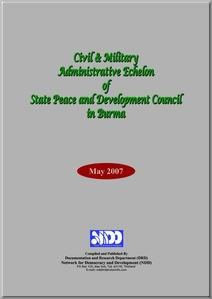BOGALAY, Myanmar, May 8 (Reuters) - When the massive storm surge churned up by Cyclone Nargis struck his village, fisherman Zaw Win clung to a tree for three hours.
The strength in his arms saved his life. He could only watch helplessly as his wife, 10-year-old son and 4-year-old daughter were dragged to their deaths by the head-high waves.
"I just held on and cried. I knew I'd lost my family," the 32-year-old told Reuters in Bogalay, one of the towns in Myanmar's Irrawaddy delta, worst-hit by Nargis' 120 mph (190 kph) winds and the wall of water they generated.
Of his coastal village of 2,000 people, just 40 survived, he said.
To get to Bogalay, 90 km southwest of the former capital Yangon, he had to wade through floating corpses before finding a boat to carry him for two hours through devastated swampland -- all that remains of the what was once the "Rice Bowl of Asia".
Desperate for help, all he found were whole streets flattened and virtually nothing to eat or drink.
"We need food, water, clothes and shelter," he said. "We'll starve to death if nothing is sent to us."
His is just one of the many harrowing tales told by survivors paddling their way out of the delta in splintered wooden boats.
Almost no aid has reached the town of 50,000 where rice mills have been ripped apart and fishing boats washed away. Myanmar's military government says at least 10,000 people died in Bogalay alone.
Twenty soldiers guarded meagre supplies of rice and instant noodles in a brick building commandeered from a women and children's association. Residents said they had received some small handouts.
On the grounds of a school, a dozen empty army trucks sat idle. One small truck laden with rice sacks headed along the narrow, potholed stone track to Bodalay on Thursday morning, escorted by a jeep filled with military officers.
Some of the first relief workers to reach Bogalay were astounded at the damage.
"It's disastrous, terrible," said Saw Simon Tha, a neurosurgeon who runs a charity-funded mobile health clinic.
Roofs were blown off almost all the houses, holes blasted in wooden walls and the streets littered with the remains of matted bamboo and thatched huts.
The wooden stands alongside the town's soccer pitch have backflipped onto the road, where electricity pilons lie mangled amidst fallen trees.
Amid the destruction, Saw Simon Tha's medical team came across Than Win, 41 years old and eight months pregnant.
She survived by climbing a tree as the water rose around her house, drowning seven of her 10 children.
That evening, in a makeshift clinic set up amid the rubble, she gave birth to her 11th child, a boy she called Chit Oo Mg.
It means "first love".
"After what happened, this is a beautiful present," she said, clutching her newborn son in her arms.
Bogalay's Buddhist temple and primary school are teeming with the homeless from nearby villages.
But many others have chosen to stay near their collapsed huts, building tents from snapped branches and reeds and drying what is left of their rice stocks on blue mesh sacking laid out on the road.
"So many people are coming here but there's no food or water," said one Western aid worker, who asked not to be identified. "There's a big risk of disease -- dysentery, malaria and severe malnutrition."
Some of the refugees lie on the bank of a creek that empties into a coconut tree-lined river as even more boats glide silently into the town during the night.
Fisherman Kyaw Way, managed to lift his wife, 10-year-old son and 7-year-old daughter into a tamarind tree. His other children, a girl of 8 and boy of 6, are missing.
"The house was blown over and then the waves came, getting higher and higher," said Way, dressed in a traditional blue longyi, or sarong, and T-shirt.
"We were in the tree from eight (in the morning) to about midnight," he said.
One of the few structures in the town to survive the onslaught was a newly built concrete bridge. People say it saved 2,000 lives.
U Zaw Mia, 68, clung on to the wooden column in the centre of his house until his sons dragged him to the relative safety of the bridge. He almost wished they hadn't.
"I was shouting at them that I wanted to die in my house," he said. (Writing by Ed Cropley; Editing by Bill Tarrant)
(Source-http://www.alertnet.org/thenews/newsdesk/BKK62774.htm)
Thursday, May 8, 2008
"I knew I'd lost my family," says Myanmar fisherman
Subscribe to:
Post Comments (Atom)



















No comments:
Post a Comment